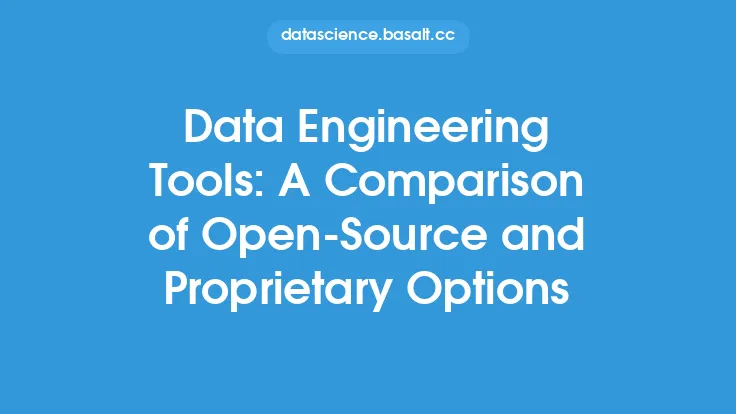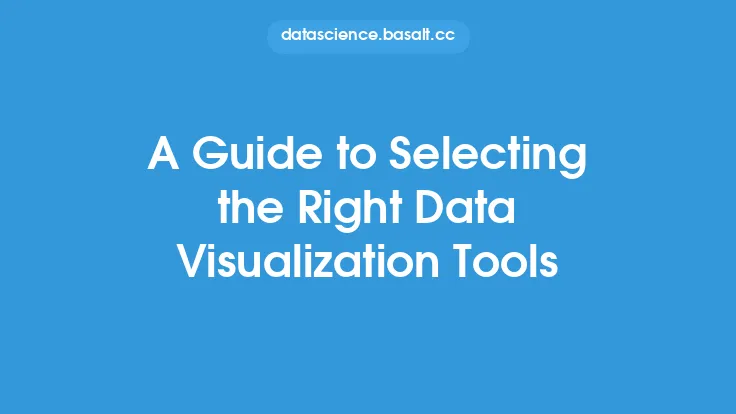As the world becomes increasingly data-driven, the importance of data engineering has grown exponentially. Data engineering is the process of designing, building, and maintaining the infrastructure that stores, processes, and retrieves data. At the heart of this process are data engineering tools, which enable data engineers to efficiently manage and analyze large datasets. In this article, we will delve into the world of data engineering tools, exploring their fundamentals, types, and applications.
What are Data Engineering Tools?
Data engineering tools are software applications that help data engineers design, develop, and maintain data systems. These tools provide a range of functionalities, including data ingestion, processing, storage, and retrieval. They enable data engineers to work with various data formats, such as structured, semi-structured, and unstructured data, and to integrate data from multiple sources. Data engineering tools can be categorized into several types, including data integration tools, data processing tools, data storage tools, and data governance tools.
Types of Data Engineering Tools
Data integration tools are used to combine data from multiple sources into a single, unified view. These tools provide data ingestion, data transformation, and data loading capabilities, enabling data engineers to integrate data from various sources, such as databases, files, and applications. Examples of data integration tools include Apache NiFi, Apache Beam, and AWS Glue. Data processing tools, on the other hand, are used to process and analyze large datasets. These tools provide data processing, data transformation, and data aggregation capabilities, enabling data engineers to perform complex data analysis and machine learning tasks. Examples of data processing tools include Apache Spark, Apache Flink, and Google Cloud Dataflow.
Data Storage Tools
Data storage tools are used to store and manage large datasets. These tools provide data storage, data retrieval, and data management capabilities, enabling data engineers to store and manage data in a scalable and efficient manner. Examples of data storage tools include relational databases, such as MySQL and PostgreSQL, NoSQL databases, such as MongoDB and Cassandra, and cloud-based data storage services, such as Amazon S3 and Google Cloud Storage. Data governance tools, on the other hand, are used to manage and govern data across the enterprise. These tools provide data discovery, data cataloging, and data lineage capabilities, enabling data engineers to manage data quality, data security, and data compliance.
Applications of Data Engineering Tools
Data engineering tools have a wide range of applications, including data warehousing, business intelligence, data science, and real-time analytics. Data warehousing involves using data engineering tools to design, build, and maintain data warehouses, which are centralized repositories that store data from multiple sources. Business intelligence involves using data engineering tools to analyze and visualize data, enabling businesses to make data-driven decisions. Data science involves using data engineering tools to build and train machine learning models, enabling data scientists to perform complex data analysis and predictive analytics. Real-time analytics involves using data engineering tools to process and analyze data in real-time, enabling businesses to respond quickly to changing market conditions.
Key Concepts in Data Engineering Tools
Several key concepts are essential to understanding data engineering tools, including scalability, performance, security, and reliability. Scalability refers to the ability of data engineering tools to handle large datasets and high volumes of data. Performance refers to the speed and efficiency of data engineering tools, enabling data engineers to process and analyze data quickly. Security refers to the ability of data engineering tools to protect data from unauthorized access and cyber threats. Reliability refers to the ability of data engineering tools to ensure data quality and data integrity, enabling data engineers to trust the data and make accurate decisions.
Best Practices for Using Data Engineering Tools
To get the most out of data engineering tools, several best practices should be followed, including designing scalable data architectures, implementing data governance policies, and monitoring data quality. Designing scalable data architectures involves using data engineering tools to build data systems that can handle large datasets and high volumes of data. Implementing data governance policies involves using data engineering tools to manage data quality, data security, and data compliance. Monitoring data quality involves using data engineering tools to track data quality and data integrity, enabling data engineers to identify and fix data issues quickly.
Future of Data Engineering Tools
The future of data engineering tools is exciting and rapidly evolving. As data continues to grow in volume, variety, and velocity, data engineering tools will need to adapt to handle these changes. Emerging trends, such as cloud-native data engineering, serverless computing, and artificial intelligence, will shape the future of data engineering tools. Cloud-native data engineering involves using cloud-based data engineering tools to build and deploy data systems. Serverless computing involves using serverless data engineering tools to process and analyze data without managing infrastructure. Artificial intelligence involves using AI-powered data engineering tools to automate data engineering tasks and improve data quality.
Conclusion
In conclusion, data engineering tools are essential for designing, building, and maintaining data systems. These tools provide a range of functionalities, including data ingestion, processing, storage, and retrieval, and can be categorized into several types, including data integration tools, data processing tools, data storage tools, and data governance tools. By understanding the fundamentals, types, and applications of data engineering tools, data engineers can build scalable, efficient, and reliable data systems that meet the needs of their organizations. As the field of data engineering continues to evolve, it is essential to stay up-to-date with the latest trends and best practices in data engineering tools.





